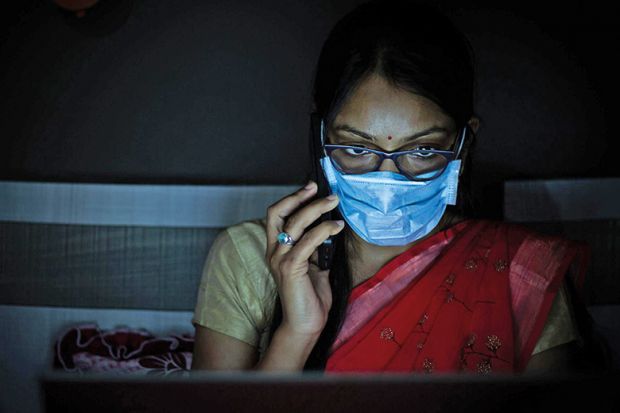A possible return to in-person teaching and exams has been thrown into doubt in India, highlighting the country's significant challenges in online education.
Education minister Ramesh Pokhriyal “Nishank” has tweeted that he plans to meet with all state education ministers to discuss online learning and the safety aspects of returning to schools and universities, which have been closed since 20 March.
The country began easing its 10-week lockdown on 8 June, although a record increase of 10,000 new Covid-19 cases was also announced on the same day. The situation has highlighted the issue of availability and accessibility of online teaching resources in a nation where the internet penetration rate is only 50 per cent.
Compared with some other Asian nations, which are relying more heavily on individual institutions to shift courses online, India seems to be taking a more centralised approach to providing digital resources.
The main state portal for online learning is Swayam, which has courses developed by about 1,000 educators. It “seeks to bridge the digital divide for students who have hitherto remained untouched by the digital revolution and have not been able to join the mainstream of the knowledge economy”. In late March, right after the lockdown began, access to national online education platforms such as Swayam tripled in one week.
The government is also promoting platforms such as the National Digital Library of India, which contains more than 48 million records, and Fossee, or “free/libre and open source software for education”, whose goal is to reduce dependency on proprietary software.
Nationwide resources are collated on three levels: e-ShodhSindhu for universities, colleges and technical institutions; e-PG Pathshala for postgraduate courses; and Vidwan for researchers.
But development has only just begun for fully online degree programmes, driven mostly by private universities. The University Grants Commission’s regulations for these courses include strict criteria, meaning that only about two dozen universities out of more than 800 have been eligible so far.
In 2019, Amity University, a private, not-for-profit institution established in 2005, became the country’s first to be given permission to offer 24 fully online degrees and diplomas. In early 2020, six other universities were also given permission, but for a smaller number of courses.
Atul Chauhan, Amity’s chancellor, told Times Higher Education that “private universities are more innovative and pioneering in many respects, as compared to public institutions, and are also able to decide and implement new ideas at a faster pace.
“The whole process of developing systems and content for online education, and training the faculty on this new mode, took a lot of commitment in terms of time, resources and the will to progress. This is why private universities like Amity were able to take the lead.”
Professor Chauhan said that the greatest challenge was training faculty how to teach online. “They have to unlearn many aspects of normal classroom teaching [that] they have been attuned to and embrace the advantages that technology aspects like artificial intelligence and adaptive systems can provide,” he said, adding that Amity has created special retraining programmes and is bringing in overseas faculty with experience in online teaching.
As for the rest of the higher education system, the government has urged universities to use a two-week teaching break in mid-June to solicit public opinion about online learning and potential reopenings, the Express News Service reported. New guidelines are expected at the end of this month.
Rahul Gandhi, managing director of Take Off Educational Consultants, told THE that “the Indian government is pushing online education in a big way. This is unprecedented and we are heading towards self-reliance and strategic shifts across all sectors.”
Register to continue
Why register?
- Registration is free and only takes a moment
- Once registered, you can read 3 articles a month
- Sign up for our newsletter
Subscribe
Or subscribe for unlimited access to:
- Unlimited access to news, views, insights & reviews
- Digital editions
- Digital access to THE’s university and college rankings analysis
Already registered or a current subscriber? Login








